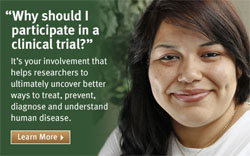NIH Clinical Research Trials and You
Office of the Director - February 24, 2012

The National Institutes of Health has launched NIH Clinical Research Trials and You, a new Web resource to help people learn more about clinical trials, why they matter, and how to participate.
Clinical research is essential to learning about ways to prevent, diagnose, and treat disease. NHLBI-sponsored clinical trials have, for example, increased our understanding of the most effective asthma treatment combinations and revealed an unexpected, increased risk for stroke, blood clots, and breast cancer in postmenopausal women who took hormone therapy.
Participation in clinical trials is critically important to advance medical discoveries. Clinical studies need both healthy volunteers and people who have medical conditions; without them, the necessary rigorous studies that promote the nation's health and safety cannot be conducted.
Among the greatest challenges to recruiting volunteers is a lack of general knowledge about what clinical trials involve, where they are carried out, and who can participate. The new NIH website is intended to answer these questions and more. The site provides useful information for members of the public, health care providers, advocacy groups, and others to raise awareness and increase understanding about clinical research.
For more information:
- NHLBI Health Topic: Clinical Trials
- Video: Children and Clinical Studies
- NHLBI Health Information Network Health e-Actions Newsletter: "Giving Thanks"
In this video, NHLBI grantee Dr. Edwin Silverman of Brigham and Women's Hospital in Boston talks about COPD Gene, which he runs with Dr. James Crapo of National Jewish Health in Denver, and about the importance of participation in clinical studies.
COPD Gene is a study of more than 10,000 volunteers across the country who are undergoing genetic assessment, state-of-the-art CAT scan imaging, breathing tests and other measurements in order to better understand why some people get COPD (chronic obstructive pulmonary disease) and others don't. The goal is to identify the genes that play a role in the development of COPD and to ultimately improve the prediction, diagnosis, and treatment of the disease.
"This research would not have been possible without the incredible support from the general population," said Dr. Silverman. "If we hadn't had enthusiastic support from our volunteers who gave up their own time to come in, get a CAT scan, go through an extensive array of tests with breathing tests and walk tests and a long list of questionnaires, if they hadn't been willing to do that, we just couldn't do the work.
"So I think that people need to understand that medical research isn't something that happens out there by other people. If they want new medical discoveries, they should really consider getting involved. They should consider being part of clinical trials, consider being part of these observational epidemiologic and genetic studies, because that's the only way we'll really learn things and we'll advance medical knowledge."
Learn more about COPD at http://www.nhlbi.nih.gov/health/health-topics/topics/copd/
















